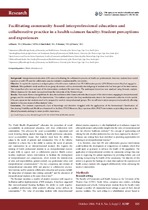| dc.contributor.author | Rhoda, Anthea | |
| dc.contributor.author | Laattoe, N. | |
| dc.contributor.author | Smithdorf, G. | |
| dc.contributor.author | Roman, Nicolette V. | |
| dc.contributor.author | Frantz, Jose M. | |
| dc.date.accessioned | 2017-06-01T08:55:13Z | |
| dc.date.available | 2017-06-01T08:55:13Z | |
| dc.date.issued | 2016 | |
| dc.identifier.citation | Rhoda, A. et al. (2016). Facilitating community-based interprofessional education and collaborative practice in a health sciences faculty: student perceptions and experiences. African Journal of Health Professions Education, 8(2): 225-228 | en_US |
| dc.identifier.issn | 2078-5127 | |
| dc.identifier.uri | http://hdl.handle.net/10566/2904 | |
| dc.identifier.uri | http://dx.doi.org/10.7196/AJHPE.2016.v8i2.846 | |
| dc.description.abstract | BACKGROUND: Interprofessional education (IPE) aims at facilitating the collaborative practice of healthcare professionals. However, students have varied
experiences with IPE and the collaborative practice initiatives implemented by universities.
OBJECTIVE: To explore the experiences and perceptions of health science students of an IPE Collaborative practice (IPECP) intervention they had engaged in.
METHODS: This qualitative study used two focus group discussions with a conveniently selected group of students who had been part of the intervention.
Two researchers who were not part of the intervention conducted the interviews. The audiotaped interviews were analysed using thematic analysis.
Ethical clearance for the study was received from the University of the Western Cape.
RESULTS: Three main themes emerged from the data: the usefulness of the framework introduced as part of the intervention; engaging in interprofessional
groups; and the overall impact of the intervention. The students reported that they needed introduction to the framework earlier for it to be useful.
It became apparent that students need to be prepared to work in interprofessional groups. The overall intervention was perceived positively, allowing
students to become aware of other students' roles.
CONCLUSION: The students experienced a lack of knowledge and therefore struggled with the applications of the International Classification of
Functioning Disability and Health as a framework to facilitate IPECP. However, they experienced the IPECP intervention as providing structure to the
clinical placements, making it a more positive experience. | en_US |
| dc.language.iso | en | en_US |
| dc.publisher | Health and Medical Publishing Group | en_US |
| dc.rights | The African Journal of Health Professions Education is an Open Access Journal and provides immediate open access to its content on the principle that making research freely available to the public supports a greater global exchange of knowledge. In accordance with the definition of the Budapest Open Access Initiative all content published by the AJHPE is made free to users without any subscription or other charges. Users are permitted to read, download, copy, distribute, print, search, or link to the full text of these articles, or use them for any other lawful, non-commercial purpose, without asking prior permission from the publisher or the author. | |
| dc.subject | Interprofessional education (IPE) | en_US |
| dc.subject | Healthcare professionals | en_US |
| dc.subject | Health sciences | en_US |
| dc.subject | Collaboration | en_US |
| dc.title | Facilitating community-based interprofessional education and collaborative practice in a health sciences faculty: student perceptions and experiences | en_US |
| dc.type | Article | en_US |
| dc.privacy.showsubmitter | FALSE | |
| dc.status.ispeerreviewed | TRUE | |
| dc.description.accreditation | DHET | en_US |

